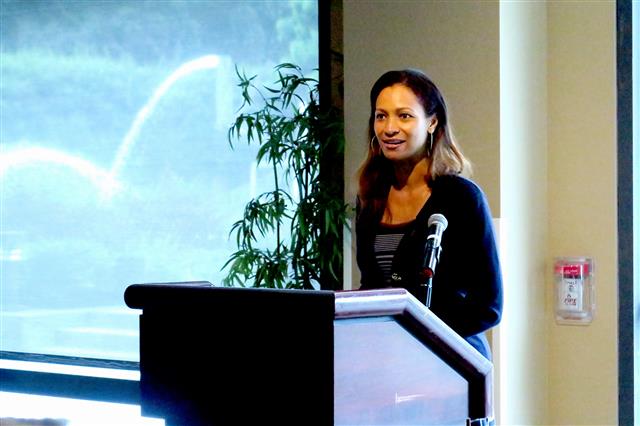LAWA Sustainability Symposium highlights strategies for aviation industry to fight climate change


Los Angeles World Airports hosted in July a Sustainability Symposium to provoke discussions about how to tackle this looming threat of climate change in part through sustainable aviation practices – including through the development of a new LAWA Sustainability Action Plan.
The event, held at Loyola Marymount University, brought together more than 80 experts and industry professionals from aviation, aerospace, concessions and academics for a half day to hear from sustainability thought leaders.
The Sustainability Symposium included remarks from L.A. City Councilman Mike Bonin (CD11), Commissioner Gabriel Eshaghian of the Los Angeles Board of Airport Commissioners (BOAC), LAWA CEO Deborah Flint and LMU Professor of Biology and Executive Director of the Center for Urban Resilience, Eric Strauss. BOAC Vice President Valeria Velasco was also in attendance.
“Los Angeles World Airports is taking bold action to do our part in the fight against climate change,” said Deborah Flint, Chief Executive Officer, LAWA. “We are adopting industry-leading policies to reduce our environmental impact and making significant investments in renewable energy and electric vehicles. Today’s symposium is a reflection of the importance of collaboration among academia, citizens and industry to realize LAX’s fullest potential as an industry-leading green airport.”
At the Sustainability Symposium, attendees heard from a panel of industry leaders, including: Matt Petersen, President and CEO, LA Clean Tech Incubator; Maria Race, Director of Environmental Policy, Programs, and Sustainability, United Airlines; Kevin Noertker, CEO and co-founder, Ampaire; Terence Young, Principal, Airports Leaders and Design Director, Gensler; and Julie Villet, URW Lab and CSR Director, Westfield. Closing remarks were given by LAWA Deputy Executive Director for the Environmental Programs Group Samantha Bricker.
The symposium is a key step on the journey toward creating LAWA’s final Sustainability Action Plan, which is being designed to further enhance LAWA’s industry-leading approach to aviation sustainability. The ambitious plan will outline how LAWA can build on its existing sustainability program by introducing new, forward-thinking initiatives while fortifying and expanding on proven steps.
LAWA’s airline and government agency partners are also exploring emissions reduction from aircraft operations through new technologies and best practices, including sustainable alternative jet fuel. And, while LAWA already has one of the largest and greenest fleets in the nation, with 57 percent of it powered by an alternative fuel or electricity, plans to replace old, diesel-powered airside buses with clean and quiet electric ones will reduce nearly 308 tons of greenhouse gas emissions each year to zero. LAWA is also in the early stages of developing a comprehensive utility monitoring and resource management plan that will help identify even more areas for conservation.
Progressive policies put in place in 2018 by LAWA will shape the airport’s infrastructure in additional sustainable ways, including designing buildings to LEED Silver or higher, and designing non-building programs such as runways to be held to similar standards. Those polices apply to LAX’s multi-billion dollar modernization project, the largest public infrastructure investment in the history of Los Angeles.
LAWA’s sustainability plan also emphasizes economic outreach with programs like Edge4Vets, How to Work with LAWA, and the successful HireLAX Apprenticeship Readiness Program. To date, HireLAX has graduated 110 students – many from disadvantaged circumstances – and prepared them to excel in building the next generation of their community’s airport.
LAWA also recently released its 2018 Sustainability Report. View the complete report at https://www.lawa.org/en/lawa-sustainability.
